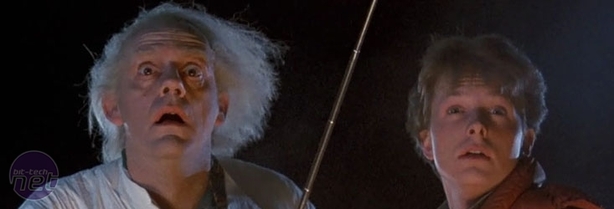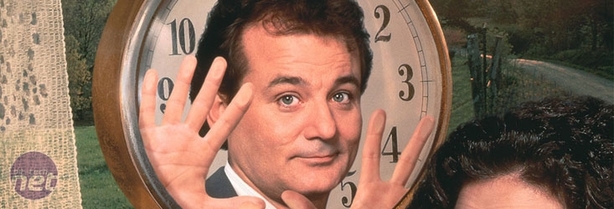Achron Interview: Your Head Will Explode
April 14, 2009 | 09:04
Companies: #hazardous-software #indie

bit-tech: Getting more into the mechanics of the gameplay, can you give us a little information about how the time travel idea works in the game? What sort of things can players do?
Chris Hazard: To start with, Achron is a 4X RTS game. We have three races (Humans and two alien races, Grekim and Vecgir), each with a very different style of play.
Players can move around the timeline of the game. You can re-watch the past like you can re-watch TV with a DVR, but also preview the likely future. You can also go in and modify the past or future. You can undo your mistakes or meet your opponent’s surprise attack with a perfectly crafted defence. However, your opponents can do all of the same things. Changes in history are propagated to the future via time waves that move faster than the rate of play.
Your ability to change the past is limited by chronoenergy. It is much more costly to modify a battle that occurred six minutes ago than a battle that happened only 30 seconds ago. In multiplayer games, we’ve found that having a modifiable timeline in the range of around eight minutes tends to work well for gameplay, although Achron supports both much shorter and longer timelines.
In addition, players can take forces from one point in time and send them to another. For example, a player can build up a small army and send it back in time to attack an opponent who was weaker in the past. We have carefully crafted the costs and gameplay aspects of sending armies back in time to keep a multitude of strategies viable and interesting, and to prevent every match from becoming a massive battle at the start of the timeline.
Achron also contains many aspects to help the player manage the game across time. For example, you can organize units into hierarchies and let them manage each other on a basic level, such as healing. Players can adopt a variety of gameplay styles. For example, one player might prefer to spend more time managing details of the near past, whereas another might tend to spend more time strategizing and make fewer but more sweeping changes to the far history.
BT: Does that mean that players can create paradoxes? How do you handle these in the game?
CH: While players are free to create paradoxes, they occur less frequently than many players initially expect. Say your tank travels back in time and destroys an enemy’s factory. There is no paradox there. A paradox only occurs if a unit built by that particular enemy factory goes back in time and destroys your factory that created the first tank. Most paradoxes, other than this example, are actually detrimental for the player to create in the first place.
If a paradox does occur, the time waves cause the paradox to cycle between all of the states of the paradox until the event falls off the edge of the timeline. For example, suppose you take a tank back in time and destroy the factory that created the tank before the tank was created. The state will cycle between 1) the tank standing next to a destroyed factory and 2) the factory remaining with the tank jumping back in time.
This is where some people say 'my head hurts', so we remind them again, that this is a rare scenario. It is resolved by the game for the player, so they don't have to think about it too much and can concentrate on their overall strategy.
Chris Hazard: To start with, Achron is a 4X RTS game. We have three races (Humans and two alien races, Grekim and Vecgir), each with a very different style of play.
Players can move around the timeline of the game. You can re-watch the past like you can re-watch TV with a DVR, but also preview the likely future. You can also go in and modify the past or future. You can undo your mistakes or meet your opponent’s surprise attack with a perfectly crafted defence. However, your opponents can do all of the same things. Changes in history are propagated to the future via time waves that move faster than the rate of play.
Your ability to change the past is limited by chronoenergy. It is much more costly to modify a battle that occurred six minutes ago than a battle that happened only 30 seconds ago. In multiplayer games, we’ve found that having a modifiable timeline in the range of around eight minutes tends to work well for gameplay, although Achron supports both much shorter and longer timelines.
In addition, players can take forces from one point in time and send them to another. For example, a player can build up a small army and send it back in time to attack an opponent who was weaker in the past. We have carefully crafted the costs and gameplay aspects of sending armies back in time to keep a multitude of strategies viable and interesting, and to prevent every match from becoming a massive battle at the start of the timeline.
Achron also contains many aspects to help the player manage the game across time. For example, you can organize units into hierarchies and let them manage each other on a basic level, such as healing. Players can adopt a variety of gameplay styles. For example, one player might prefer to spend more time managing details of the near past, whereas another might tend to spend more time strategizing and make fewer but more sweeping changes to the far history.
BT: Does that mean that players can create paradoxes? How do you handle these in the game?
CH: While players are free to create paradoxes, they occur less frequently than many players initially expect. Say your tank travels back in time and destroys an enemy’s factory. There is no paradox there. A paradox only occurs if a unit built by that particular enemy factory goes back in time and destroys your factory that created the first tank. Most paradoxes, other than this example, are actually detrimental for the player to create in the first place.
If a paradox does occur, the time waves cause the paradox to cycle between all of the states of the paradox until the event falls off the edge of the timeline. For example, suppose you take a tank back in time and destroy the factory that created the tank before the tank was created. The state will cycle between 1) the tank standing next to a destroyed factory and 2) the factory remaining with the tank jumping back in time.
This is where some people say 'my head hurts', so we remind them again, that this is a rare scenario. It is resolved by the game for the player, so they don't have to think about it too much and can concentrate on their overall strategy.

MSI MPG Velox 100R Chassis Review
October 14 2021 | 15:04











Want to comment? Please log in.